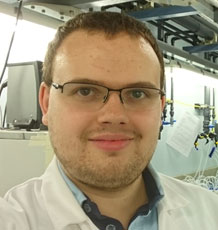Name: Cameron Hird
Discipline: Biosciences: Marine Ecotoxicology
Location: Lab 201, Geoffrey Pope Building, Streatham Campus
What is the working title for your research project?
Common pharmaceutical contaminants have mode-of-action effects and reproductive toxicity which are sensitive to pCO2 conditions in marine invertebrates.
Can you describe your research project in more detail?
My research looks at the effects of pharmaceutical chemicals on marine invertebrates. These chemicals are excreted by humans and often not directly removed during sewage treatment processes; consequently they are released in to the environment where they come into contact with marine organisms. Furthermore, I look at the impacts of carbon dioxide in water (ocean acidification) on the uptake and toxicity of these chemicals to marine organisms.
…and can explain it in a single sentence?
I study the effects of human pharmaceuticals released from sewage treatment on marine organisms and how aspects of climate change impact these effects.
What is a typical day like?
My days are highly varied. Often I can spend weeks in the office writing and researching but I prefer lab work. My lab work can range from testing the effects of cocaine on marine worms to performing artificial fertilisations with sea urchins. On the odd occasion I even get to enjoy a bit of muddy fieldwork around Devon.
What would you say is your proudest moment during your research journey so far?
Getting my first citation. Although there is something special about having your PhD work published with you as a first author, there is something even more exciting about people citing your work in their research. It shows that the reach of your research truly is global.
What do you like to do when you are not researching?
I am obsessed with the sport of korfball. It is a Dutch sport that is a basketball / netball hybrid. I train 5 times a week with both Exeter University and Exeter City and play matches at the weekend.
If you could start again, what would be your advice to yourself as a new postgraduate researcher?
Don’t get too caught up in the finer details! I am self-confessed obsessive-compulsive about things and like things to be just right. Unfortunately, it is all too easy to spend the vast majority of my time perfecting small things and not focussing on the bigger things. A certain amount of perfection is beneficial, but don’t get too carried away.
And finally- can you describe your research project in 5 emojis
– The pill because I work on pharmaceuticals.
– The wave because I look at the effects of pharmaceuticals in the ocean.
– The crab because it is a marine invertebrate which is what I study.
– The factory as they release carbon dioxide emissions which contribute to ocean acidification.
☠️- The skull and crossbones because ocean acidification changes the toxicity of the pharmaceuticals.
Cameron Hird is a fourth-year postgraduate research student looking at the impacts of pharmaceuticals on marine invertebrates at the University of Exeter. Passionate about the marine environment from a young age, Cameron achieved a 1st class BSc(Hons) degree in Marine Biology at the University of Plymouth in 2014 before progressing to postgraduate research at the University of Exeter. In his free time Cameron likes to spend time with his pets and playing korfball, as well as running a postgraduate indoor hockey group.

